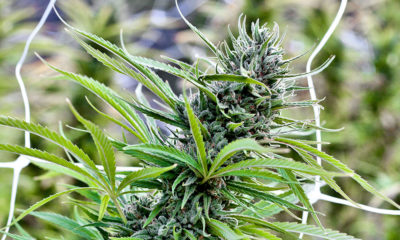
Cannabis
Clones Are Carrying Pesticides Into California Supply Chain
Berkeley laboratory Steep Hill found pesticides in over 86 percent of the clones they tested.
A new study from Steep Hill Labs has found that the clones being grown out to maturity by California cannabis cultivators are the likely point of origin for contaminants entering the state’s supply chain.
Steep Hill conducted the study to figure out where the contaminants that they frequently encounter during their routine testing originate from. In the past, numerous farmers getting their product tested at Steep Hill claimed to be using clean, organic farming practices from start to finish, but then their bud would come back testing positive for pesticides. Some farms with contaminated cannabis even carried the Clean Green Certification, which is essentially the Schedule I narcotics version of USDA Organic.
“When we released the first study on pesticides in October of 2016, many growers approached Steep Hill saying that they did not use pesticides, they were organic, they were trying to do the right thing for their patients and consumers,” said Steep Hill CEO Jmichaele Keller, while announcing the study last week. “After hearing this over and over again, we knew there was something wrong in the supply chain.”
From there, it dawned on Keller that the source had to be clones. The crack team of pot scientists at his disposal began formulating a plan. “Our mission is to make sure that growers have all of the tools and expertise needed to successfully pass new California regulations,” said Keller. “We undertook this study to understand the concern of our clients who were also perplexed by the pesticide reports we were issuing.”
Something as easy as testing clones may seem like a cakewalk to one of the labs at the most cutting edge of cannabis technology; nevertheless, their scientists were as meticulous as ever in compiling the research for the study.
“The report documents clone sources and locations, descriptions of how samples were prepared and analyzed, and the comprehensive findings,” said Dr. Reggie Gaudino, the author of the study. “A crucial issue in the industry is that very few growers are breeding to deliver genetic stability, unlike other crops which have been stabilized over decades utilizing sophisticated agricultural processes.”
Gaudino explained further that stable genetic lines provide the ability to grow from seed and thus produce hardy, reproducible product.
“We need to work together to ensure that traditional practices in the industry are re-examined and changed in light of this data,” Gaudino said.
We asked Josh Drayton of the California Cannabis Industry Association what the crazy news means to cultivators.
“I think it’s crazy, but I think within the industry this is something we’ve started to know a little bit more,” he said.
Drayton said that since Steep Hill conducted research in Los Angeles that found contaminants in a majority of the collected samples, it has been pretty clear there is an issue. With Steep Hill being a member of CCIA, this has been a continuing conversation between the two for quite some time.
Drayton spoke to the sheer number of folks coming back claiming their entire cultivation process was pesticide-free. “I think they wanted to dig a bit deeper into it, there has got to be some truth to that. When it came down to it, it is coming from clones and that’s an issue,” said Drayton.
Drayton then commented on the actual generations it takes for these pesticides to be worked out of the genetics. While popular claims of five or six generations are regularly made, he was quick to point out this estimate is “just lore, it’s not even fact at this point.” Drayton believes the contamination levels could be a bigger problem for the industry if not addressed.
We pointed out to Drayton that quality clones are a bottleneck point already for the ever-expanding California cannabis industry and asked how this will impact responsible cultivators doing their best to get clean genetics.
“Ultimately it’s going to be an issue that has to be handled at the state level,” he responded. “If that means clones have to be tested to guarantee the rest of the supply chain is not affected, then I believe that’s probably the direction they’ll go. I think this is just coming to the surface and just starting to be a conversation.”
Drayton says he isn’t sure if any real immediate solutions are even known at this point.
Dr. Amanda Reiman of the International Cannabis Farmers Association also weighed in on the new research.
“This speaks to the importance of knowing the source of your cannabis,” said Reiman. “Prohibition forced a situation where consumers had very little information and choice about their cannabis products. We are emerging out of the shadows, and like food, consumers want to know that what they ingest is healthy, free from chemicals, and has been tested to ensure it will not make them ill. One of the many benefits of regulation is consumer safety and the ability to make informed choices about what we consume.”
TELL US, do you prefer pesticide-free cannabis?





















